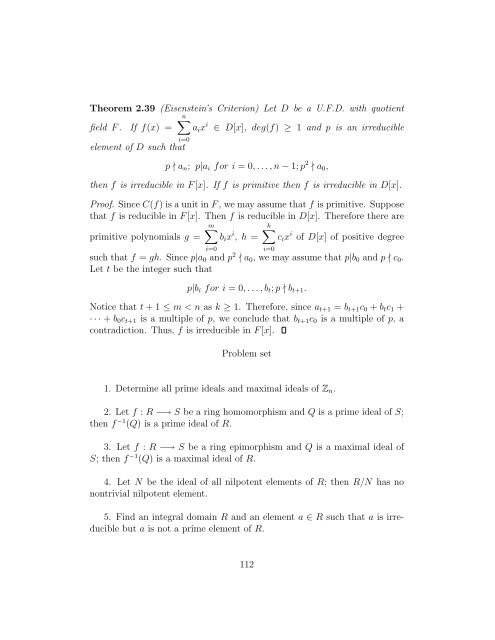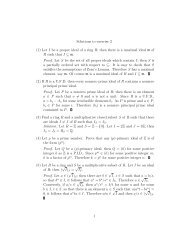Topics in algebra Chapter IV: Commutative rings and modules I - 1
Topics in algebra Chapter IV: Commutative rings and modules I - 1
Topics in algebra Chapter IV: Commutative rings and modules I - 1
You also want an ePaper? Increase the reach of your titles
YUMPU automatically turns print PDFs into web optimized ePapers that Google loves.
Theorem 2.39 (Eisenste<strong>in</strong>’s Criterion) Let D be a U.F.D. with quotient<br />
field F . If f(x) =<br />
n<br />
aix i ∈ D[x], deg(f) ≥ 1 <strong>and</strong> p is an irreducible<br />
i=0<br />
element of D such that<br />
p ∤ an; p|ai for i = 0, . . . , n − 1; p 2 ∤ a0,<br />
then f is irreducible <strong>in</strong> F [x]. If f is primitive then f is irreducible <strong>in</strong> D[x].<br />
Proof. S<strong>in</strong>ce C(f) is a unit <strong>in</strong> F , we may assume that f is primitive. Suppose<br />
that f is reducible <strong>in</strong> F [x]. Then f is reducible <strong>in</strong> D[x]. Therefore there are<br />
m<br />
primitive polynomials g = bix i k<br />
, h = cix i of D[x] of positive degree<br />
i=0<br />
such that f = gh. S<strong>in</strong>ce p|a0 <strong>and</strong> p 2 ∤ a0, we may assume that p|b0 <strong>and</strong> p ∤ c0.<br />
Let t be the <strong>in</strong>teger such that<br />
i=0<br />
p|bi for i = 0, . . . , bt; p ∤ bt+1.<br />
Notice that t + 1 ≤ m < n as k ≥ 1. Therefore, s<strong>in</strong>ce at+1 = bt+1c0 + btc1 +<br />
· · · + b0ct+1 is a multiple of p, we conclude that bt+1c0 is a multiple of p, a<br />
contradiction. Thus, f is irreducible <strong>in</strong> F [x].<br />
Problem set<br />
1. Determ<strong>in</strong>e all prime ideals <strong>and</strong> maximal ideals of Zn.<br />
2. Let f : R −→ S be a r<strong>in</strong>g homomorphism <strong>and</strong> Q is a prime ideal of S;<br />
then f −1 (Q) is a prime ideal of R.<br />
3. Let f : R −→ S be a r<strong>in</strong>g epimorphism <strong>and</strong> Q is a maximal ideal of<br />
S; then f −1 (Q) is a maximal ideal of R.<br />
4. Let N be the ideal of all nilpotent elements of R; then R/N has no<br />
nontrivial nilpotent element.<br />
5. F<strong>in</strong>d an <strong>in</strong>tegral doma<strong>in</strong> R <strong>and</strong> an element a ∈ R such that a is irreducible<br />
but a is not a prime element of R.<br />
112



